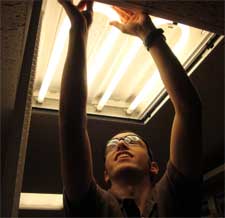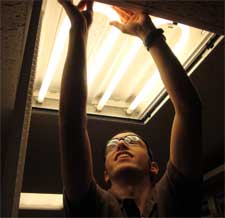 KINGSTON, R.I. – September 24, 2009 – A team of University of Rhode Island students working with the URI Energy Center has developed a plan to help the Naval War College in Newport reduce its energy consumption and install renewable energy facilities to meet a Department of Defense directive.
KINGSTON, R.I. – September 24, 2009 – A team of University of Rhode Island students working with the URI Energy Center has developed a plan to help the Naval War College in Newport reduce its energy consumption and install renewable energy facilities to meet a Department of Defense directive.
The students spent the summer analyzing the College’s energy bills, conducting energy audits of its buildings, and researching appropriate renewable energy options that will achieve the goal of reducing energy consumption by 30 percent below 2003 levels by 2015. They presented their recommendations last month to Rear Admiral Phil Wisecup, president of the War College, who enthusiastically endorsed the plan and encouraged the students to continue working with his staff to immediately implement the plan.
“These young students simply did a fantastic job with this project,” Wisecup said.
The students – Sarah Sylvia of Bristol, Kevin Silveira of East Providence, and Rachel Ackerman of Sutton, Mass. – were enlisted in the project through the URI Energy Center Fellows Program, an interdisciplinary initiative that provides students with hands-on experience solving real-world energy problems incorporating formal research methods and applied outreach efforts.
“Our initial task was to conduct a baseline study of the War College’s energy consumption, but then we took additional steps and made recommendations,” said Sylvia, 27, a student in the URI Blue MBA program, which prepares students to work on environmental initiatives in the business world. “We looked at a wide variety of measures they could take, from no-cost solutions to small scale upgrades and large renewable energy projects.”
Visits to every building on the Naval War College campus found a wide variety of inefficiencies in energy use, including areas that had more lighting than necessary, outdoor lights that were on during daylight hours, occupancy sensors that were not working properly, and computers that were never turned off.
“We found a lot of little things that can have a big impact on their energy bill,” said Silveira, 21, a URI senior studying mechanical engineering. “Changing behaviors may be the hardest thing to do because they’ve been doing things the same way for years and years, but we hope to get the faculty, staff and students to switch their mindset to be more energy conscious and more waste conscious.”
Among the students’ recommendations was the installation of two small-scale wind turbines that will stand about 30 meters tall and each generate two kilowatts of electricity. They also proposed installing a solar thermal heating system and a small, rooftop photovoltaic system.
To save money on the solar elements of the proposal, the War College hopes to partner with URI to have students design a customized photovoltaic installation. The War College also hopes to bring in additional URI Energy Fellows next summer to continue the research and provide oversight on implementing the plan.
“When we presented our findings and recommendations to the Admiral, he essentially said to go do it all, go find more energy savings, and to do it quickly,” Silveira said. “That reaction was a big surprise to us; it went beyond our expectations. But I think our proposal went beyond their expectations, too.”
“It’s a wonderful example of what people can do together, and of how talented these young URI students are,” Wisecup said. “The URI faculty deserves a lot of credit here, too. We are so pleased to be working together on this. It’s a real win-win.”
The students said that the next step in the project is to develop an action plan for implementing the recommendations in a timely way. In the winter they will also use a thermal camera to find areas of heat loss in buildings that could benefit from the installation of new windows, insulation and other weatherization strategies.
The students have also been asked by the Admiral to make a presentation about their recommendations to the administration of the Newport Naval Base commanding officer, as well as to other senior Navy leaders.
For more information about the URI Energy Center or the Fellows Program, visit www.uri.edu/cels/ceoc.
Pictured above
URI student Kevin Silveira evaluates lighting at the Naval War College in Newport as part of an energy assessment of the facility.

